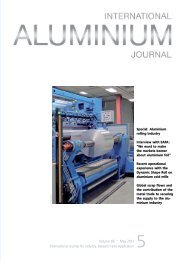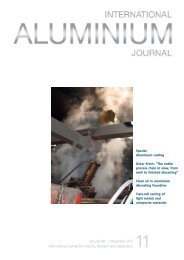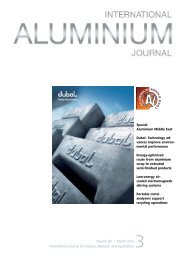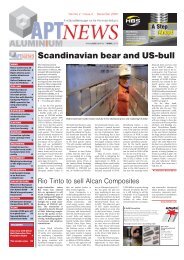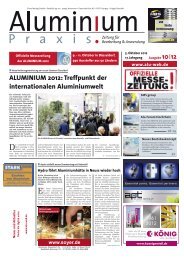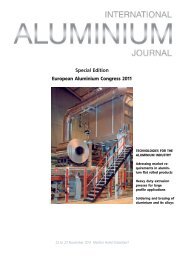sPeCIAL ArABAL - ALUMINIUM-Nachrichten – ALU-WEB.DE
sPeCIAL ArABAL - ALUMINIUM-Nachrichten – ALU-WEB.DE
sPeCIAL ArABAL - ALUMINIUM-Nachrichten – ALU-WEB.DE
Create successful ePaper yourself
Turn your PDF publications into a flip-book with our unique Google optimized e-Paper software.
ECONOMICS<br />
tributor) have referred their dispute (source:<br />
Annual report 2012). This information leads<br />
to the conclusion that the gas cogeneration<br />
power plant, built within the production complex<br />
of Aluminium S.A., has not contributed<br />
to reducing electricity costs to an extent that<br />
would be suitable and profitable for Aluminium<br />
S.A.<br />
This price per megawatt hour is lower<br />
by about €20/MWh than the price that PPC<br />
had been charging Aluminium S.A. following<br />
a unilateral decision and despite the lack of<br />
contract for the period of July 2010 up until<br />
mid-May 2012 (date when the decision was<br />
made by RAE, deciding on a temporary price).<br />
The impact of CO 2 emissions charges implemented<br />
in 2013 may additionally increase<br />
electricity costs by €6/MWh unless the state<br />
implements subsidises for energy intensive industries,<br />
including Aluminium S.A.<br />
Exemplary in safety<br />
Aluminium S.A. has a long tradition in safety<br />
performance since it was part of the Pechiney<br />
group, and the management is very proud of<br />
that. It is regarded as one of the safest aluminium<br />
plants in the world for workers, with<br />
only few accidents a year (and only one injury<br />
at work in 2006) .<br />
In December 2012 a new collective agreement<br />
was made between the management of<br />
Aluminium S.A. and the company’s labour<br />
union. The agreement resulted in preserving<br />
all employment positions and the production<br />
capacity of the plant as well as significant cost<br />
streamlining on a viable and long-term basis.<br />
Technical features<br />
Aluminium S.A. uses tried and tested Pechiney<br />
technology, a point-feeder system, enclosed<br />
pot cells and pre-baked anodes. Potlines A<br />
and B (since 1986) operate at 70 kA (520 pots)<br />
and potline C at 90 kA (since 1971, 260 pots).<br />
Since 1995 the plant has been equipped with<br />
central computer control and graphic tracking<br />
of the production process in all potlines.<br />
Current efficiency is 93% and electricity consumption<br />
is 13,200 kWh/t. Consumption of<br />
anodes is 405 kg/t Al , aluminium fluoride is 10<br />
kg/t, alumina 1,900 kg/t, so the plant has the<br />
lowest specific consumption of raw materials<br />
and consumables compared to all other producers<br />
in the region. Aluminium S.A. processes<br />
around 1.4m tonnes of Greek bauxite<br />
and 200,000 tonnes of imported (tropical)<br />
bauxite; it produces around 800,000 tpy of<br />
alumina (460,000 tpy for export) and 164,000<br />
tpy of primary metal (around 90,000 tpy for<br />
the Greek market). The anode plant has a production<br />
capacity of 90,000 tpy of anodes.<br />
Average pot life is 100 months (more than<br />
eight years), which is one of the best results for<br />
this type of cell and technology in the world.<br />
The plant’s port is capable of accommodating<br />
and serving ships of tonnages up to 50,000<br />
tonnes. It is equipped with three electric rail<br />
cranes, the alumina ship loader and all necessary<br />
storage facilities for raw materials and<br />
products. The loading installations for the alumina<br />
cargo to be exported (bulk cargo) can<br />
achieve loading rates exceeding 600 tph.<br />
The smelter uses Tardis equipment for its<br />
dross handling. Tardis is a fully patented process<br />
of rapid cooling and pressing. The equipment,<br />
which was awarded a Queen’s Award<br />
for Enterprise in the Innovation category, has<br />
been designed to maximise aluminium recovery<br />
from dross, whilst eliminating the associated<br />
dust and fume.<br />
The new 334-MW high-efficiency combined<br />
heat and power (CHP) plant, or cogeneration<br />
plant, is located within the complex<br />
of Aluminium S.A. It is connected to the regional<br />
gas pipeline that comes from Russia<br />
In July the EU Commission has referred Greece<br />
to the European Court of Justice for failing to<br />
comply with two distinct Commission decisions<br />
that ordered Greece to recover incompatible<br />
state aid from three Greek casinos and from Aluminium<br />
of Greece S.A. (AoG). In both cases, over<br />
two years after the Commission decisions, the<br />
full aid amounts have still not been paid back.<br />
The EU Commission requested Greece to<br />
recover incompatible state aid in the form of<br />
preferential electricity tariffs from AoG. The aid<br />
amount is calculated as the difference between<br />
PCC’s revenues from the standard tariff between<br />
and across Bulgaria to Athens and the port of<br />
Piraeus. The plant came into operation in 2008<br />
and is equipped with the latest technology. It<br />
operates using natural gas and, apart from<br />
electricity, produces steam which is used in<br />
the alumina production process. Any surplus<br />
electricity produced is fed into the national<br />
electricity grid.<br />
Author<br />
Goran Djukanovic is an independent aluminium<br />
market analyst. He is located in Podgorica, Montenegro.<br />
Email: gordju@t-com.me.<br />
EU Commission refers Greece to court for failure<br />
to recover incompatible aid from AoG<br />
January 2007 and March 2008 and the revenues<br />
from the tariff that was actually applied to AoG<br />
in the same period. The Commission calculated<br />
the aid principal as amounting to 17.4 million<br />
euros.<br />
The aid given to AoG has not been recovered<br />
up to date. The recovery procedure has been<br />
suspended by a national court, in clear violation<br />
of EU law. AoG has appealed the Commission’s<br />
2011 decisions before the EU General Court.<br />
However, no interim measures have been requested<br />
nor granted and the appeals have no<br />
suspensive effect.<br />
Source: Eurobank Equities Research<br />
© Djukanovic<br />
18 <strong><strong>ALU</strong>MINIUM</strong> · 9/2013



